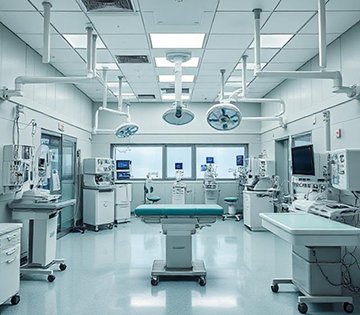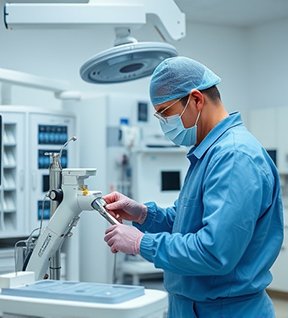Published: January 06, 2014 | Updated: September 15, 2025
Published: January 06, 2014 | Updated: September 15, 2025
15 Essential CMMS Functions for Superior Medical Clinic Management
 In the often fast-paced and highly regulated world of medical clinics, maintaining operational efficiency and ensuring patient safety tops the list of goals. This requires meticulous management of a wide array of assets, from sophisticated medical equipment to essential facility infrastructure. While many industries recognize the value of a computerized maintenance management system (CMMS), people often overlook its application within healthcare settings. However, a properly implemented CMMS can help organize clinic operations, offering a multitude of benefits that extend beyond basic equipment upkeep. To illustrate this, let's delve into the 15 key functions that a CMMS can perform for your medical clinic, demonstrating its indispensable role in modern healthcare management.
In the often fast-paced and highly regulated world of medical clinics, maintaining operational efficiency and ensuring patient safety tops the list of goals. This requires meticulous management of a wide array of assets, from sophisticated medical equipment to essential facility infrastructure. While many industries recognize the value of a computerized maintenance management system (CMMS), people often overlook its application within healthcare settings. However, a properly implemented CMMS can help organize clinic operations, offering a multitude of benefits that extend beyond basic equipment upkeep. To illustrate this, let's delve into the 15 key functions that a CMMS can perform for your medical clinic, demonstrating its indispensable role in modern healthcare management.
Comprehensive Asset and Equipment Management
In the complex environment of a medical clinic, You must properly manage assets and equipment. The sheer volume of medical devices, diagnostic tools, and support systems necessitates a quality tracking system. A CMMS provides the means to catalog and monitor every piece of equipment, from bedside monitors to complex imaging machines.
This comprehensive tracking ensures that you have all relevant information for the assets accounted for, each machine, and up-to-date preventive maintenance (PM). This functionality keeps operational efficiency and ensures that critical equipment is always ready for patient care.
Enhanced Vehicle and Fleet Maintenance
Beyond in-clinic equipment, healthcare facilities often manage fleets of vehicles, including ambulances and transport vans. A CMMS extends its capabilities to vehicle maintenance, allowing for meticulous tracking of service schedules, repair histories, and compliance checks.
With this data, you know emergency vehicles stay available, ready to respond to critical situations.
Rigorous Medication and Chemical Tracking
The management of medication and chemicals in a medical setting falls under stringent regulations. A CMMS provides a secure and auditable system for tracking inventory, usage, and expiration dates. With documentation, you minimize the risk of errors, prevent stockouts, and stay compliant with regulatory requirements. Automated alerts for reordering and expiration help to maintain a seamless supply chain and avoid potential liabilities.
Centralized Documentation and Warranty Management
Like above, maintaining comprehensive documentation for every piece of equipment, medication, and chemical keeps you compliant and operationally efficient. A CMMS serves as a centralized repository for all relevant documents, including manuals, certifications, and safety data sheets.
Additionally, the system stores warranty information, enabling quick access for scheduled PMs or you receive maintenance requests. This centralized approach saves time and reduces the risk of lost or misplaced documents.
Financial Oversight and Budgetary Control
While not an accounting tool, a CMMS provides valuable financial insights by generating reports on maintenance labor costs, parts expenses, and overall maintenance expenditures. These reports enable facility managers to track spending, identify cost-saving opportunities, and develop accurate budgets for future maintenance needs. The data allows for a better understanding of the allocation of money.
 Proactive Maintenance Scheduling and Prevention
Proactive Maintenance Scheduling and Prevention
While some of the above sections have mentioned preventative maintenance, one can't overstate its importance. Equipment reliability directly impacts patient safety. A CMMS allows for the creation of scheduled maintenance tasks including inspections and regular service.
You need this proactive approach. With a reactive mindset, you risk unexpected breakdowns and a reduction of the lifespan of valuable assets.
Prioritizing Patient Comfort and Responsiveness
Patient comfort is a key consideration in any healthcare environment. A CMMS facilitates the management of patient requests, such as temperature adjustments, equipment repairs, and special accommodations. By tracking these requests and assigning them to maintenance personnel, the system ensures timely responses and enhances patient satisfaction. You'd find this especially important in long-term care facilities.
Maintaining Facility Appearance and Hygiene
Assets go beyond the medical equipment. You have buildings, hallways, common areas, parking lots, walkways, and grounds. The appearance and cleanliness of a medical facility play a significant role in patient perception and satisfaction.
Once again, the CMMS comes into play with more scheduled PMs. Routine cleaning tasks, tracking maintenance of common areas, regular roofing, HVAC, plumbing, and structural inspection, and addressing any cosmetic issues that may arise.
Mitigating Liability and Ensuring Compliance
More compliance issues come in the form of maintaining accurate records of maintenance activities, medication administration, and chemical usage. CMMS provides an auditable trail of all activities, demonstrating due diligence and responsiveness.
Energy Efficiency and Cost Reduction
Properly maintained equipment operates more efficiently, reducing energy consumption and lowering operational costs. A CMMS can track energy usage patterns and identify areas for improvement, such as upgrading to more energy-efficient equipment or optimizing HVAC systems. This helps to reduce the facility’s utility usage and save money.
Driving Profitability and Service Excellence
Ultimately, a well-managed medical clinic means a profitable clinic. A CMMS contributes to profitability by reducing downtime, minimizing costs, and enhancing patient satisfaction.
CMMS and Medical Clinics: A Winning Combination
In the demanding environment of a medical clinic, a CMMS transcends its role as a mere maintenance tool, evolving into a strategic asset that safeguards patient well-being and operational efficiency. By meticulously managing assets, ensuring compliance, and prioritizing patient comfort, a CMMS enables healthcare providers to deliver exceptional care while minimizing risks and controlling costs. Its capacity to track medication, schedule preventative maintenance, and maintain facility appearance fosters an environment where patient trust and satisfaction are paramount.
Ultimately, the implementation of a quality CMMS within a medical clinic translates to more than just operational improvements; it drives profitability and service excellence. By proactively addressing maintenance needs, mitigating liabilities, and optimizing resource utilization, healthcare facilities can focus on their core mission: delivering superior patient care. This comprehensive approach not only enhances the clinic’s bottom line but also reinforces its reputation as a trusted and reliable healthcare provider within the community.
For more information read the article from GE Healthcare.
FAQs
What are the primary benefits of using a CMMS in a medical clinic?
A CMMS helps to organize clinic operations by meticulously managing assets, ensuring regulatory compliance, and prioritizing patient comfort, which ultimately leads to improved operational efficiency and profitability.
How can a CMMS help with asset and equipment management?
A CMMS provides a way to catalog and monitor every piece of equipment, ensuring that all relevant information is accounted for and that critical equipment is always ready for patient care through up-to-date preventive maintenance.
Can a CMMS manage more than just medical equipment?
Yes, a CMMS can extend its capabilities to manage a wide range of assets, including vehicles, facility infrastructure, and even tracking medication and chemicals to ensure compliance and prevent liabilities.
How does a CMMS from MAPCON help with documentation?
A CMMS from MAPCON can serve as a centralized repository for all relevant documents like manuals and certifications, and it also stores warranty information for quick access during maintenance.
What role does a CMMS play in patient safety?
By ensuring critical equipment is well-maintained and ready for use, and by providing a secure system for tracking medication and chemicals, a CMMS helps mitigate risks and uphold patient safety standards.
How can a CMMS improve financial oversight?
A CMMS can provide valuable financial insights by generating reports on maintenance labor costs and parts expenses, helping facility managers track spending and identify cost-saving opportunities.
MAPCON | 800-922-4336
MAPCON CMMS software empowers you to plan and execute PM tasks flawlessly, thanks to its wealth of features and customizable options. Want to see it for yourself? Click the button below to get your FREE 30-day trial of MAPCON!
Try It FREE!